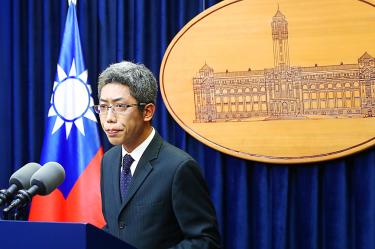China yesterday announced more measures to open its markets to Taiwanese firms and treat Taiwanese the same as Chinese, but Presidential Office spokesman Ting Yun-kung (丁允恭) said they are just a ploy to divide Taiwanese and try to influence the Jan. 11 elections.
The new measures will allow Taiwanese companies to invest or participate in projects ranging from 5G to civil aviation to theme parks, and allow them to issue bonds to raise capital.
China’s Taiwan Affairs Office (TAO) said the government would also make it easier for Taiwanese to live and work China as well as give them the right to seek consular help from Chinese embassies and consulates.
The 26 measures, which represent the “thorough implementation of [Chinese President] Xi Jinping’s (習近平) promise to provide Taiwanese compatriots with equal treatment,” came into effect immediately, the TAO said.
The offer is Beijing’s latest example of Xi’s strategy to try to bypass official contact in favor of direct incentives aimed at embroiling Taiwanese firms, organizations and the public in the Chinese market and state subsidy system.
The new measures are another attempt to sell Beijing’s “one country, two systems” formula to Taiwanese, but they actually offer few benefits and serve mainly as a way of influencing Taiwan’s elections, Ting said.
Beijing should be engaging in positive exchanges for cross-strait peace and stability, instead of launching yet another round of “favorable policies” focused on Taiwanese, he added.
The Mainland Affairs Council (MAC) said the new measures were aimed at promoting unification.
These so-called “favoring Taiwan efforts” are contradicted by Beijing’s continuing efforts to suppress this nation by grabbing its diplomatic allies, blocking its international space and conducting military exercises in the Taiwan Strait, a council statement said.
Those who go to China need to be aware of the risks and the “differences in the system,” the council added.
The Ministry of Foreign Affairs also issued a statement criticizing Beijing’s offer to allow Taiwanese in trouble abroad to seek assistance from Chinese embassies and consulates.
A source familiar with national security issues said the measures on “promoting cross-strait economic and cultural exchanges” were an attempt to implement Beijing’s “one country, two systems” in Taiwan.
They are also part of efforts by Beijing to mitigate the effects of an exodus of Taiwanese and foreign investors from the Chinese market due to the US-China trade dispute, the source said.
Taiwanese firms shifting operations to Taiwan or to Southeast Asian nations have put pressure on China, especially its technology sector, and the new steps are an attempt to counteract this situation, the source added.
“China is trying to rationalize its bullying of Taiwan on the world stage, while trying to convince Taiwanese that it is showing them benevolence,” the source said.
Former Chinese leader Deng Xiaoping (鄧小平) once promised that after the 1997 Hong Kong handover “horse races would still go on, and nightclubs would stay open,” but the current situation in the territory proves life has not continued normally, the source said.
“Lessons can been drawn from Hong Kong’s case as to what Beijing’s granting of so-called ‘national treatment’ would be for Taiwanese,” the source added.
Source: Taipei Times - 2019/11/05





















